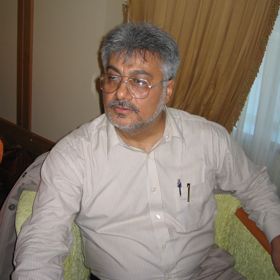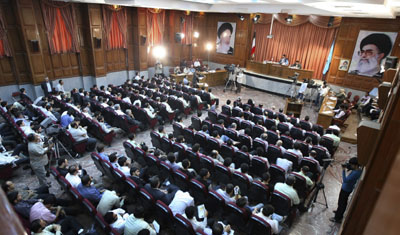News coverage of economic sanctions barred by Iran
New York, July 12, 2012–Iranian authorities have issued new censorship guidelines barring domestic news outlets from reporting on the impact of Western economic sanctions, local and international news outlets reported Wednesday. And, with at least three imprisonments reported, the government is continuing its years-long anti-press campaign.

Iran arrests four journalists; dozens deteriorating in prison
New York, December 7, 2010–The Committee to Protect Journalists condemns today’s arrest of four Iranian journalists at the daily Sharq. CPJ is also disturbed by recent news reports that indicate the abusive treatment endured by dozens of imprisoned Iranian prisoners has adversely affected the health of many of them–including Issa Saharkhiz, at left, a founding member of the now-defunct Association…
Iran arrests two more critical journalists
New York, July 22, 2010—The Committee to Protect Journalists has learned that Iran is continuing to arrest journalists, with two more detained in June. CPJ calls on the authorities to release all imprisoned journalists, and to allow reporters to conduct their work unimpeded.

With 52 journalists in jail, Iran hits new, shameful record
New York, March 9, 2010—The number of journalists in jail rose in February as a relentless media crackdown continues in Iran. Authorities are now holding at least 52 journalists in prison, a third of all those in jail around the world, according to the latest monthly survey by the Committee to Protect Journalists.
CPJ urges Iran to release journalists during Ramadan
New York, September 16, 2009—As Muslims worldwide prepare to celebrate the end of the holy month of Ramadan, a time of compassion and forgiveness, the Committee to Protect Journalists today called on the Iranian authorities to release journalists who are being held behind bars.
As media arrests mount, Iran solidifies a dishonor
New York, July 22, 2009–The Committee to Protect Journalists has confirmed the detentions of another four journalists in Iran. CPJ research shows the continuing arrests have solidified Iran’s dishonorable standing as the world’s leading jailer of journalists.
Attacks on the Press in 2008: Iran
President Mahmoud Ahmadinejad’s economic policies and human rights record drew widespread criticism from academics, activists, and journalists. In response, Ahmadinejad sought to suppress independent media by manipulating government subsidies, exerting censorship, and using the punitive tools of detention and harassment.
Attacks on the Press 2007: Iran
IRAN Iran’s troubled economy weakened President Mahmoud Ahmadinejad’s power at home, with protests spilling into the streets and intellectuals, activists, and students expressing dissent in the media. Silencing the uproar became essential for Ahmadinejad, prompting authorities to intensify a media crackdown that had been waged by conservative forces for a decade. Iran became the world’s…